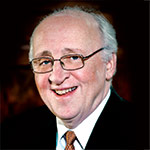Grace Note Reflections on the Christian Life
Sunday to Monday
Spiritual Support for Our Daily Work
By Richard Mouw | Illustration by Mike Austin

“My pastor has no idea of the kind of world I live in six days a week.” That came from a prominent business person, a venture capitalist, during a lunch we had together when I visited the city where he works.
And even though that particular comment was clearly a complaint, it was expressed in a larger context in which he was speaking quite warmly about his involvement in the local church.
His congregation has good programs for his children, and he and his wife are involved in a small group they find spiritually nurturing. His pastor preaches good, biblically based sermons. All of that is very positive in his mind. What is missing, though, is any sort of connection to his actual daily work experience.
I pushed him for more. What would it take to make the necessary connections? He wasn't exactly sure.
“I'd like a better theology of money,” he said, “but I really don't expect my pastor to preach detailed sermons on economics.” He paused for a few moments and then offered this comment: “I guess I would just like a little more of a sense that my church understood better what it is like to live with the complexities that I have to face every day!”
I have thought much about that conversation. If I were that man's pastor, what could I do to speak more directly to his felt needs as a businessperson?
One thing I would not do is to preach detailed sermons about economics. My lunch partner made it clear that he was not asking for that kind of thing, and I agree with him. What this person was asking for was more sensitivity to the kinds of complexities he faces on a daily basis — a reasonable expectation. And his pastor could respond to this need in helpful ways without becoming an expert on corporate finance.
For starters, his pastor could schedule a lunch with this man for the purpose of finding out what the man was facing that day. The pastor might even prepare for that lunch by visiting the man's office to get a sense of his work environment. It would be encouraging for the businessperson to know that his pastor wanted to experience something — even if only a small slice — of his workaday world.
Another outreach would be to include the subject of business complexities in congregational prayers. This would not have to include a lot of detail. Simply mentioning the fact that there are businesspeople who need prayer support for their complex challenges can be an encouraging gesture.
I saw something like this happen in a rather dramatic fashion in our congregation, a large Presbyterian church where many Hollywood folks are members.
One Sunday our pastor mentioned in his sermon the need for Christians to be active in attempting to have a positive influence on popular culture. He acknowledged that this was no easy thing, and that people engaged in this activity on a day-to-day basis need our prayers.
At that point he asked for a show of hands of everyone present who worked “in the industry.” Many hands went up. Then he asked each of us who had not raised our hands to extend a hand of blessing toward folks with their hands raised as he prayed for God's special presence with them during the coming week.
I noticed tears streaming down the cheeks of a woman near where we were sitting who had raised her hand. I remembered those tears the next day and prayed for her again. I don't know what her challenges were, but I was glad that the fact that she does face unique challenges in her work was explicitly recognized by the rest of us. And it was clear that she too appreciated that acknowledgment.
My sense is that the businessperson with whom I talked might also shed a tear of gratitude if the sheer recognition of the complexities of his life were made explicit in his times of worship.
Indeed, I am grateful for such support in my own life. My pastor recently said to me, “I pray for you regularly in your work.” I found that comforting.
I don't need him to know the details of the challenges that I face as an educational administrator. Some weeks they are financial, some weeks they have to do with staffing concerns, and sometimes my trials have to do with the nuances of theology.
But it does help to know that I do have spiritual support for my daily work, a support based on a clear recognition of the connection between faith and work. The businessperson with whom I talked deserves the same.

Richard J. Mouw has served as the president of Fuller Theological Seminary since 1993 and is the author of 17 books. This essay was first published in Faith & Leadership.
